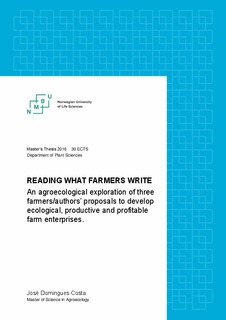Reading what farmers write : an agroecological exploration of three farmers/authors’ proposals to develop ecological, productive and profitable farm enterprises
Master thesis
Permanent lenke
http://hdl.handle.net/11250/2398774Utgivelsesdato
2016-08-11Metadata
Vis full innførselSamlinger
- Master's theses (IPV) [240]
Sammendrag
Writings of successful ‘alternative’ farmers have generated much interest among aspiring farmers, media and the general public. Research in food systems, however, seems to have paid little attention to such cases. Should researchers be looking more closely at these approaches?
This thesis uses a Case Study Analysis to explore the accounts and proposals of three farmer-authors – Joel Salatin, Mark Shepard and Richard Perkins. The analysis of the first two is based in the authors’ books, articles and interviews available online, while the third is also based in participant observation and semi-structured interviews. As the use of sustainability as an all-encompassing concept often muddles discussions, this study used a different method, analyzing these approaches in light of how desirable they are, how they sustain the resources they require, and their potential and appeal for broad adoption.
These approaches were found to be generally in line with agroecological principles and likely to be among the best in various aspects of desirability and sustainability. Although they are knowledge intensive, they use low capital approaches which may ease their adoption. Moreover, they convey narratives that weave elements of entrepreneurship, ethics and personal fulfillment that are little studied in agroecological literature.
Although solid conclusions require more detailed research, these models appear to be good prototypes for a return to highly diversified multi-purpose farms. Useful next steps include researching the actual values of their productivity and profitability, the extent of potential market for similar models, and how to develop the know-how required to make such farms work.
Beskrivelse
This thesis uses a case study analysis to explore the accounts and proposals of three farmer-authors – Joel Salatin, Mark Shepard and Richard Perkins – to create productive, profitable, ecological and enjoyable farm enterprises and discuss their contribution to a better agriculture, food system, and society.

